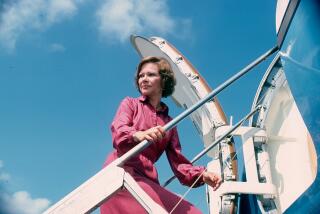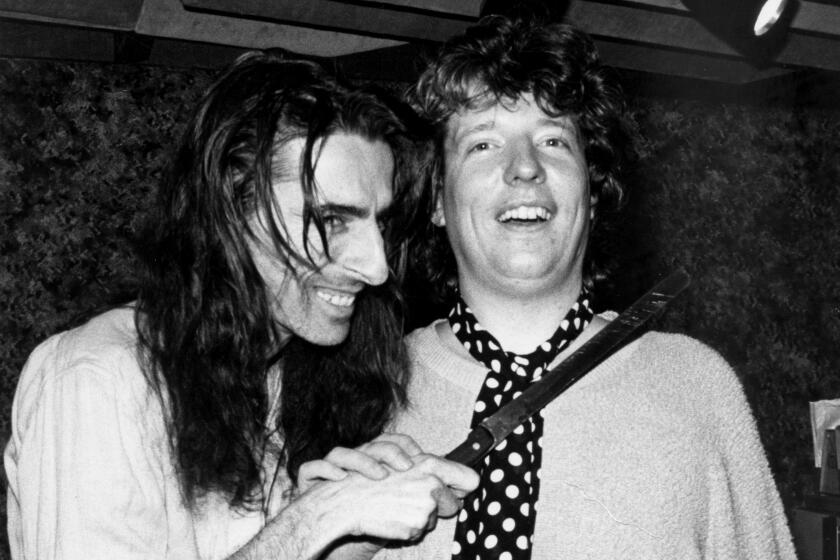Happy Rockefeller dies at 88; wife of Nelson Rockefeller
- Share via
“Most people can get a divorce without having the world hang on it,” Margaretta “Happy” Rockefeller once told a reporter.
But in 1963, divorce was still a scandal. And she and her husband were not “most people.”
That year, she married Nelson Rockefeller, the New York governor and front-runner for the 1964 Republican nomination for president. Their marital history was widely seen as a political drawback that cost him the ticket.
Happy Rockefeller, who ultimately served as the nation’s second lady when her husband became Gerald Ford’s vice president and used her prominence to help reshape public attitudes toward breast cancer, has died. She was 88.
A family spokesman said she died Tuesday at her home in Tarrytown, N.Y., after a short illness.
In the early 1960s, the sexual revolution was still a distant rumble and divorce was viewed as a disgrace. So when the politically ambitious scion of the oil-rich Rockefeller clan ended his long first marriage to marry a socialite 18 years his junior — someone who had left her husband and four young children to be with him — the headlines were not confined to the society page.
“Gov. Nelson A. Rockefeller, gambling his political future for his love, married newly divorced Margaretta (Happy) Murphy Saturday,” The Times’ story about their May 4, 1963, marriage began.
Leading Republicans were unsparingly critical.
“Have we come to the point where a governor can desert his wife and children, and persuade a young woman to abandon her four children and husband?” Prescott Bush, the former U.S. senator who was father of a future president and grandfather of another, told the New York Times. “Have we come to the point where one of the two great parties will confer its greatest honor on such a one? I venture to hope not.”
A divorced man had never won the White House. (That barrier would not be broken until Ronald Reagan’s election in 1980.) When Nelson Rockefeller divorced his first wife, the former Mary Todhunter Clark, in 1962, he dropped in the polls but, to the surprise of pundits, quickly regained his popularity.
His remarriage was generally regarded as a detriment to his political fortunes but a boon to that of his chief rival for the 1964 GOP nomination, Arizona Sen. Barry Goldwater, who surged in the polls after Rockefeller said “I do” for the second time.
Although modest and shy, Happy Rockefeller joined her husband on the campaign trail, surprising some observers who expected a femme fatale. Journalist Theodore H. White later wrote that she reminded him of “tennis, not nightclubs; soap, not perfume; sailing, not sport cars.”
Her husband was unable to sway enough voters, however, and withdrew from the race. Goldwater won the nomination but suffered a lopsided loss in the general election to President Lyndon Johnson. Nelson Rockefeller was in his fourth term as New York governor when he became vice president under Ford.
------------
FOR THE RECORD
May 22, 3:56 p.m.: This obituary states that Nelson Rockefeller was in his fourth term as New York governor when he became vice president. He had resigned as governor the previous year. An earlier version of this correction said that he had completed his fourth term.
------------
Happy Rockefeller had hoped he would retire from politics after he was done being governor. “I had wanted that to be the end of politics,” she told the Chicago Tribune decades later. “I wanted Nelson to come home so we would have time.”
He died of a heart attack in 1979, two years after he and Ford left office.
Margaretta Large Fitler was born June 9, 1926, in Bryn Mawr, Pa., one of two children of William Wonderly Fitler Jr., who was heir to a rope-making fortune, and his socialite wife, the former Margaretta Large Harrison.
The mainline Philadelphia family included Gen. George Gordon Meade, one of her great-grandfathers, who was commander of the Union forces at Gettysburg. Another great-grandfather, Edwin H. Fitler, was mayor of Philadelphia in the late 19th century.
Nicknamed Happy because of her sunny disposition as a child, she completed her formal education at Shipley’s, a private finishing school, where she was a good athlete but an average student.
After graduating in 1944, she was a hospital volunteer in Philadelphia during the last stages of World War II. In 1948, she married Army Medical Corps Capt. James Slater Murphy, whose family moved in the same social orbit as the Rockefellers.
When Nelson ran for governor of New York in 1958, she became a campaign volunteer and later a full-time staff member. When they married in 1963, she lost custody of her four children with Murphy, who had also remarried.
In 1974, First Lady Betty Ford announced that she had breast cancer and underwent a mastectomy. Heeding Ford’s advice, Rockefeller performed a self-examination and discovered a lump in her left breast. Her husband, who was awaiting confirmation as vice president, made the announcement while she was on the operating table and credited the first lady with raising awareness of breast cancer and how to detect it.
His wife soon underwent a second mastectomy after cancer was discovered in her other breast. She later wrote about her ordeal and recovery in Reader’s Digest. “I have never felt better physically and I am happier now than I have ever been,” she wrote.
Ford and Rockefeller were credited with a rise in the number of women seeking early detection of breast cancer and widely praised for their willingness to deal openly with the dreaded disease.
Rockefeller faced it with humor as well as courage.
She woke up from the first operation “with Nelson and the doctor hanging over me,” she recalled some years ago in the New York Daily News. “Well, I’ve had six children, so the first thing I asked was, ‘Is it a boy or a girl?’”
Her survivors include three children from her first marriage, two children with Rockefeller, and 14 grandchildren. One daughter, Malinda Menotti, died in 2005.
Twitter: @ewooLATimes
More to Read
Start your day right
Sign up for Essential California for the L.A. Times biggest news, features and recommendations in your inbox six days a week.
You may occasionally receive promotional content from the Los Angeles Times.






